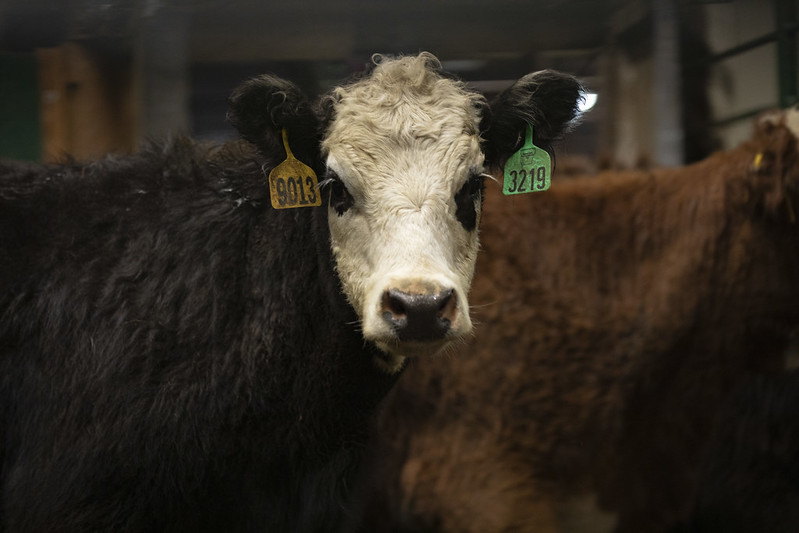River Valley Beef Cattle Conference to focus on efficiency
By Tracy Courage
U of A System Division of Agriculture
Fast Facts:
- Conference for cattle producers focuses on managing input costs, stretching fertilizer, freezer beef yields, new herbicides, perennial grass control
- Conference is Feb. 15 in Morrilton
- Registration is $20 at door, includes lunch
(405 words)
MORRILTON, Ark. – This year’s River Valley Beef Cattle Conference will focus on efficiency, presenting the latest recommendations for cattle producers looking to keep costs down and profits up.
The conference will be on Feb. 15 from 9 a.m. – 12 p.m. at the Conway County Fairgrounds, 901 E. Elm St. in Morrilton. Registration opens at 8:30 a.m.; the cost is $20 and includes a steak lunch.
The annual conference, hosted by the University of Arkansas System Division of Agriculture, brings together faculty, meat scientists, livestock economists and extension specialists to share research-based information to help producers plan and manage their operations.
Cattle producers from the River Valley area — Conway, Crawford, Faulkner, Franklin, Johnson, Logan, Newton, Perry, Pope, Sebastian and Yell counties — are invited to attend.
“This year’s conference will focus on ways to be most efficient with production inputs in order to keep costs down to remain profitable,” said Bob Harper, Logan County extension staff chair. “We aren’t expecting beef prices to keep up with input costs, so increased efficiency is a must.”
Many Arkansas producers are struggling with rising input costs — namely, increasing fertilizer prices, which are tied to increasing grain and fuel prices.
The conference also will address market trends, such as the continued popularity of freezer beef among consumers. “Freezer beef” refers to the purchase of all or part of a live animal for slaughter, rather than purchasing finished beef cuts at a grocery store, for example.
“The price spike of beef at the beginning of the pandemic seemed to really increase the demand for homegrown freezer beef,” Harper said.
The 2022 conference agenda includes:
8:30 a.m. – Registration
9 a.m. – Introductions and welcome: Kevin Van Pelt, Conway County extension agent
9:05 a.m. – Welcome: Farm Credit of Western Arkansas
9:10 a.m. – Freezer beef yields and questions, Dr. Janeal Yancey, University of Arkansas meat scientist
9:50 a.m. – Managing increased input costs in beef production, Dr. James Mitchell, livestock economist, UA System Division of Agriculture
10:35 a.m. – Break
10:50 a.m. Stretching your fertilizer: Matt Fryer, extension soil health instructor, UA System Division of Agriculture
11:30 – New herbicides/Perennial grass control, Dr. John Boyd, weed scientist and visiting assistant professor, UA System Division of Agriculture
12:15 p.m. Lunch and adjourn
To learn about extension programs in Arkansas, contact your local Cooperative Extension Service agent or visit www.uaex.uada.edu. Follow us on Twitter and Instagram at @AR_Extension.
About the Division of Agriculture
The University of Arkansas System Division of Agriculture’s mission is to strengthen agriculture, communities, and families by connecting trusted research to the adoption of best practices. Through the Agricultural Experiment Station and the Cooperative Extension Service, the Division of Agriculture conducts research and extension work within the nation’s historic land grant education system.
The Division of Agriculture is one of 20 entities within the University of Arkansas System. It has offices in all 75 counties in Arkansas and faculty on five system campuses.
Pursuant to 7 CFR § 15.3, the University of Arkansas System Division of Agriculture offers all its Extension and Research programs and services (including employment) without regard to race, color, sex, national origin, religion, age, disability, marital or veteran status, genetic information, sexual preference, pregnancy or any other legally protected status, and is an equal opportunity institution.
# # #
Media contact:
Tracy Courage
Director, Communications Services
U of A System Division of Agriculture
Cooperative Extension Service
(501) 671-2126
tcourage@uada.edu
